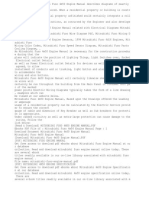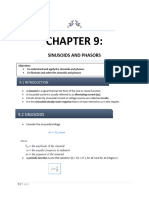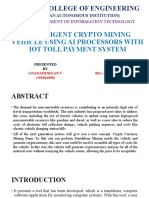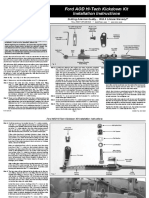CS304 Object oriented Programming
1. Class Declaration
Definition: Blueprint for creating objects.
// Syntax
class ClassName {
// data members
// member functions
};
// Example
class Car {
public:
void drive() {
cout << "Driving..." << endl;
}
};
2. Object Creation
Definition: Creating an instance of a class.
// Syntax
ClassName objName;
// Example
Car myCar;
myCar.drive(); // Output: Driving...
3. Constructor
Definition: Special function called automatically when an object is created.
// Syntax
class ClassName {
public:
ClassName() { // Constructor
// code
}
};
// Example
class Car {
public:
Car() {
cout << "Car created\n";
� }
};
Car c; // Output: Car created
4. Destructor
Definition: Special function called automatically when an object is destroyed.
// Syntax
~ClassName();
// Example
class Car {
public:
~Car() {
cout << "Car destroyed\n";
}
};
5. Access Specifiers
Definition: Control access level to class members.
// Syntax
class MyClass {
private:
int a; // accessible only inside class
protected:
int b; // accessible in derived class
public:
int c; // accessible everywhere
};
6. Encapsulation
Definition: Wrapping data and functions into a single unit (class).
// Example
class Bank {
private:
int balance;
public:
void setBalance(int b) { balance = b; }
int getBalance() { return balance; }
};
7. Inheritance
�Definition: Acquiring properties of one class into another.
// Syntax
class Derived : access Base {
// body
};
// Example
class Animal {
public:
void speak() { cout << "Animal speaks\n"; }
};
class Dog : public Animal {
};
Dog d;
d.speak(); // Output: Animal speaks
8. Multiple Inheritance
Definition: A class inherits from more than one base class.
// Syntax
class Derived : public Base1, public Base2 {
};
// Example
class A {
public:
void showA() { cout << "A\n"; }
};
class B {
public:
void showB() { cout << "B\n"; }
};
class C : public A, public B {
};
C obj;
obj.showA(); // A
obj.showB(); // B
9. Function Overloading
Definition: Same function name with different parameters.
// Example
class Print {
public:
void show(int a) { cout << "Int: " << a << endl; }
void show(double b) { cout << "Double: " << b << endl; }
};
�Print p;
p.show(5); // Int: 5
p.show(5.5); // Double: 5.5
10. Function Overriding
Definition: Redefining base class function in derived class.
// Example
class Base {
public:
void show() { cout << "Base\n"; }
};
class Derived : public Base {
public:
void show() { cout << "Derived\n"; }
};
Derived d;
d.show(); // Output: Derived
11. Polymorphism
Definition: Ability to take many forms (Compile-time and Runtime).
// Compile-time: function overloading
// Runtime: function overriding with pointers
class Animal {
public:
virtual void speak() { cout << "Animal\n"; }
};
class Dog : public Animal {
public:
void speak() override { cout << "Dog\n"; }
};
Animal* a = new Dog();
a->speak(); // Output: Dog (runtime polymorphism)
12. Virtual Functions
Definition: Functions meant to be overridden in derived classes.
// Example
class Base {
public:
virtual void display() { cout << "Base\n"; }
};
class Derived : public Base {
�public:
void display() override { cout << "Derived\n"; }
};
Base* b = new Derived();
b->display(); // Output: Derived
13. Abstract Class
Definition: Class with at least one pure virtual function.
// Syntax
class Abstract {
public:
virtual void show() = 0; // pure virtual function
};
// Example
class Derived : public Abstract {
public:
void show() { cout << "Implementation\n"; }
};
14. This Pointer
Definition: Pointer to the current object.
// Example
class MyClass {
private:
int x;
public:
void setX(int x) {
this->x = x;
}
};
15. Friend Function
Definition: Non-member function with access to private members.
// Example
class Box {
private:
int width;
public:
Box() { width = 10; }
friend void printWidth(Box b);
};
�void printWidth(Box b) {
cout << "Width is: " << b.width << endl;
}
16. Static Members
Definition: Shared among all objects of a class.
// Example
class Demo {
public:
static int count;
Demo() { count++; }
};
int Demo::count = 0;
17. Operator Overloading
Definition: Giving special meaning to an operator.
// Example
class Complex {
public:
int real, imag;
Complex(int r, int i) : real(r), imag(i) {}
Complex operator + (const Complex& obj) {
return Complex(real + obj.real, imag + obj.imag);
}
};
18. Namespace
Definition: Used to avoid naming conflicts.
// Example
namespace first {
void show() { cout << "First\n"; }
}
namespace second {
void show() { cout << "Second\n"; }
}
first::show(); // First





















































































